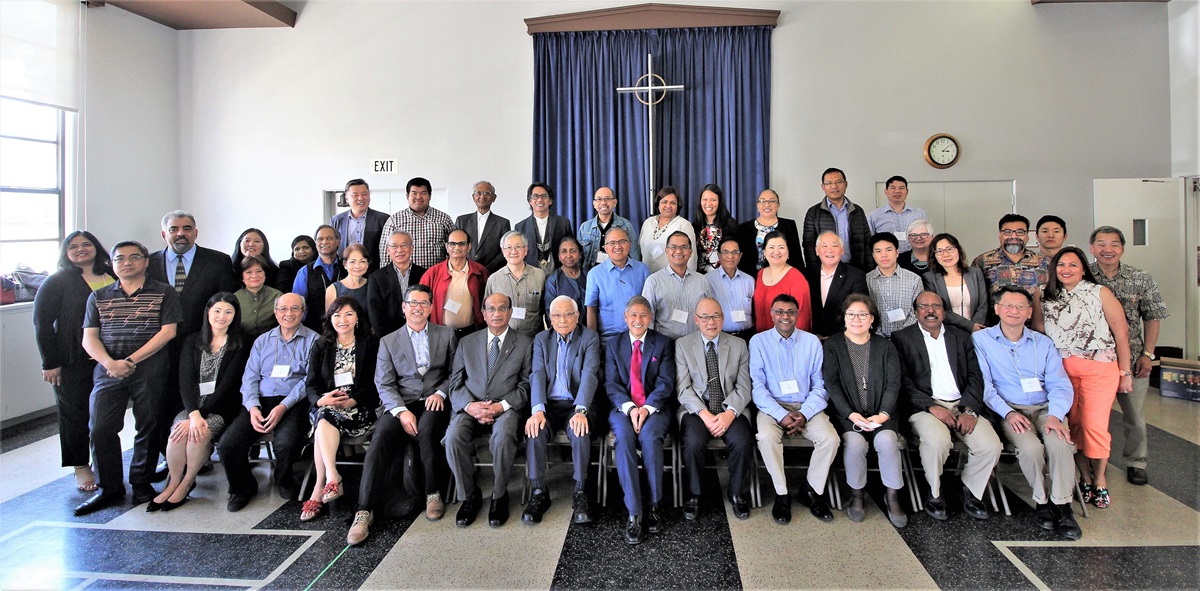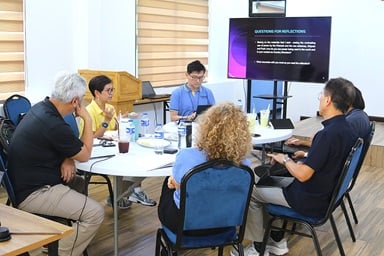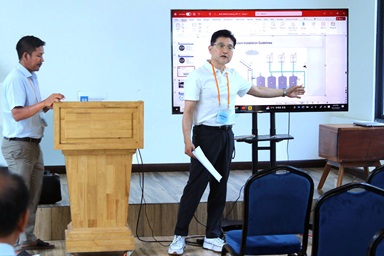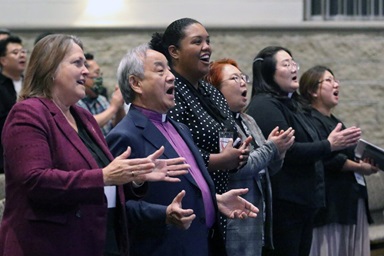Asian-American United Methodists recently gathered to celebrate their deep roots in the denomination.
The National Federation of Asian American United Methodists joined together for fellowship and worship on May 4 at El Segundo United Methodist Church in El Segundo, California. The group’s biannual conference marked 43 years of striving to ensure Asian-Americans have a voice in denominational decision-making.
“Most people don’t know that this organization started in the ’70s as a way for Asian-American United Methodists to organize, advocate for their communities and have a unified voice at the table,” said the Rev. John Oda, recently elected as the federation’s president.
Pong Javier II, a longtime lay leader in the group, called the federation “a church home” that gives him a chance to connect with United Methodists of similar or like experiences.
“I am proud as an Asian,” he said. “I pray that more NFAAUM members will serve beyond the local church. There is great need for the larger church to learn about our cultures. Our youth must learn our culture.”
Pong has served on the boards of various United Methodist agencies, including the Commission on the Status and Role of Women for eight years, United Methodist Communications for four years, and the Commission on Religion and Race for four years. He is currently serving as the chair of Older Adult Ministries of the Northern Illinois Conference.
The federation is one of the products of changes in the 1960s American society, Pong said.
Amid nation efforts to end discrimination based on race, the Immigration and Nationality Act of 1965 abolished restrictions that had limited immigration mainly to Europe. The act opened the door to more immigrants from Asia, Africa and Latin America.
Not long after, The United Methodist Church formed in 1968, bringing an end to the Central Jurisdiction that had segregated African-Americans from their Methodist brethren. The 1968 General Conference also saw the creation of the Commission on Religion and Race, which was directed to “challenge the denomination’s agencies, institutions, annual conferences and congregations to achieve full, equal participation of its racial and ethnic minority constituencies in the total life and mission of the church.”
As the result of the 1968 General Conference and the efforts of Asian-American United Methodist, the first Asian Caucus National Convocation was held in 1970.
The caucus officially took the name the National Federation of Asian American United Methodists during its meeting Dec. 6-12, 1975, at Glide Memorial United Methodist Church in San Francisco.
The federation began with representatives from four ethnic groups — Chinese, Filipino, Japanese and Korean. Now it has grown to include 12 ethnic sub-caucuses: Cambodian, Filipino, Laotian, Korean, Chinese, Vietnamese, Hmong, South Asian, Japanese, Pakistani, Middle Eastern, and Taiwanese/Formosan. The organization will soon add two more ethnic sub-caucuses: representing Nepalese and Karen United Methodist communities.
Anna Rhee, another longtime leader of the Asian-American community, attended the first NFAAUM meeting when she was 17 years old. She remembers completing a sign-up sheet passed around for the Glide convocation attendees to possibly be placed on United Methodist boards and agencies. Rhee later served on the United Methodist Board of Church and Society.
Jonah Jung also remembers the first NFAAUM gathering held at Glide Memorial. He said that Bishop Wilbur Choy, the first Asian-American bishop elected in the denomination, was the honored guest and speaker at the gathering. Jung was selected and appointed as executive director of the NFAAUM.
Another significant group of Asian-Americans in the United Methodist Church are clergywomen, who have been witnesses against not only racism but also sexism in society. There are two clergywomen’s groups that seek to provide a voice for Asian clergywomen: the Association of Asian American and Pacific Islander Clergywomen and the National Association of Korean American United Methodist Clergywomen.
The two groups plan to have the Ohana Conference on July 9-11 in Honolulu. The conference, whose name is the Hawaiian word for “family,” will also celebrate the 10th anniversary of Association of Asian American and Pacific Islander Clergywomen. Its theme will be “You Belong Here.”
The Rev. HiRho Park, an executive with the United Methodist Board of Higher Education and Ministry, said whenever Asian clergywomen gather together, they have a worship service, fellowship, mutual support and celebration of clergywomen’s ministry in The United Methodist Church.
Oda, NFAAUM’s new president, noted that Asian-Americans represent an increasing population in the church’s mission field. According to Pew Research Center, the U.S. Asian population grew faster than any other racial or ethnic group between 2000 and 2015, growing by 72 percent. More than 20.4 million people in the U.S. have Asian roots.
These are people in need of spiritual care, Oda said. “The United Methodist Church should pay close attention to Asians in the U.S.,” he said. “While some of these groups are non-Christian, the mission field is there. We are mandated by God to grow the church (as stated in) John 15:8 ‘This is to my Father’s glory, that you bear much fruit, showing yourselves to be my disciples.’”
Oda is a third-generation Japanese-American. His grandparents immigrated to the United States from Japan in the 1920s. During World War II all of Oda’s relatives were thrown into American internment camps simply because of their Japanese heritage. With his family experience and awareness of social justice, he wants to “be a consistent voice and steadfast advocate for all 12 of the sub-ethnic caucuses at the denominational level.”
He urges churches and conferences to provide a spiritual gathering place where Asian-Americans can be themselves and give solace, healing, comfort and encouragement to each other.
The federation’s mission may not be completed in a short time period, Oda said, but NFAAUM will continue to work for the glory of God and for the people of God.
“I will covet your prayers, your positive vibes and support!”
Kim is director of Korean and Asian news at United Methodist Communications. Contact him at 615-742-5470 or [email protected]. To read more United Methodist news, subscribe to the free Daily or Weekly Digests.
Like what you're reading? Support the ministry of UM News! Your support ensures the latest denominational news, dynamic stories and informative articles will continue to connect our global community. Make a tax-deductible donation at ResourceUMC.org/GiveUMCom.




